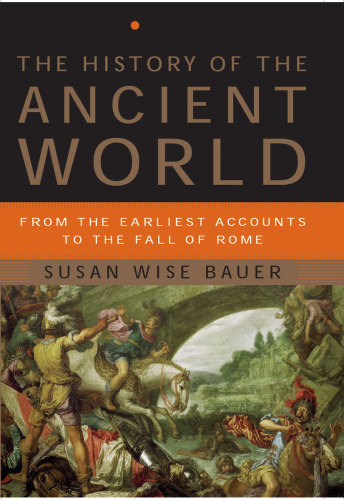
The History of the Ancient World
From the Earliest Accounts to the Fall of Rome
کتاب های مرتبط
- اطلاعات
- نقد و بررسی
- دیدگاه کاربران
نقد و بررسی

November 20, 2006
Bauer (author of the four-volume The Story of the World: History for the Classical Child
) guides readers on a fast-paced yet thorough tour of the ancient worlds of Sumer, Egypt, India, China, Greece, Mesopotamia and Rome. Drawing on epics, legal texts, private letters and court histories, she introduces individuals who lived through the famines, plagues, floods, wars and empire building of the ancient world: the marvelous array of characters includes Gilgamesh, Sumer's first epic hero; Yü, the founder of the Xia dynasty in China; and Tiglath-Pileser III, who restored the Assyrian empire's fortunes. Because Bauer covers so much time and territory, she focuses on the Western cultures with which she seems most comfortable; the chapters on Asia and India are the least developed. In addition, some of her assertions—for instance, that the biblical book of Joshua is the clearest guide we possess to the establishment of an Israelite kingdom in Canaan—contradict general scholarly opinion or are simply wrong. However, Bauer's elegant prose and her command of much of the material makes this a wonderful starting point for the study of the ancient world. 80 maps.

February 15, 2007
Bauer (American literature, Coll. of William & Mary; "The Well-Educated Mind") has produced a good introductory history to the ancient world in this first volume of a new series. Divided into more than 80 chapters, the work focuses on Western history but devotes space to the development of ancient civilizations in China and India. Time lines, 13 illustrations, and 80 maps are interspersed throughout to help guide readers through the twists and turns of assassinations, wars, and natural disasters that largely make up the history of the ancient world. An endnotes and a works-cited section are included. Those looking for a more scholarly examination may want to turn to D. Brendan Nagle's "The Ancient World: A Social and Cultural History", but Bauer's book is recommended for all libraries needing a good primer on ancient history. [See Prepub Alert, "LJ" 10/1/06.]Sean Michael Fleming, Lebanon P.L.s, NH
Copyright 2007 Library Journal, LLC Used with permission.

January 1, 2007
Bauer's annals, which span the millennia between the traces of Sumer and the Roman emperor Constantine's conversion to Christianity in 312 CE, are an attractive introduction to a subject vast in time and geography. She writes briskly and interpretively, and is attuned throughout to the challenge of rulers: appearing to the ruled as legitimate holders of power. This sensibility makes her narratives acutely interesting, as Bauer pierces the biases inherent in most ancient sources to discern the sincerity or the cynicism with which power seekers pursued their goals. Above, approval of the divine was invaluable; on Earth, a loyal army was indispensable. Acquiring both enabled lawgivers to make their writ stick, and Bauer's chronicles exhibit the interaction of priestly, military, and legal powers as empires and dynasties wax and wane. This endows continuity to her accounts of polities as disparate as the Harappan civilization of the Indus River or the states that emerged from misty prehistory along the Yellow and Yangtze rivers to form China. Nonacademic and sometimes colloquial in composition, Bauer's survey will spark the imagination.(Reprinted with permission of Booklist, copyright 2007, American Library Association.)

























دیدگاه کاربران